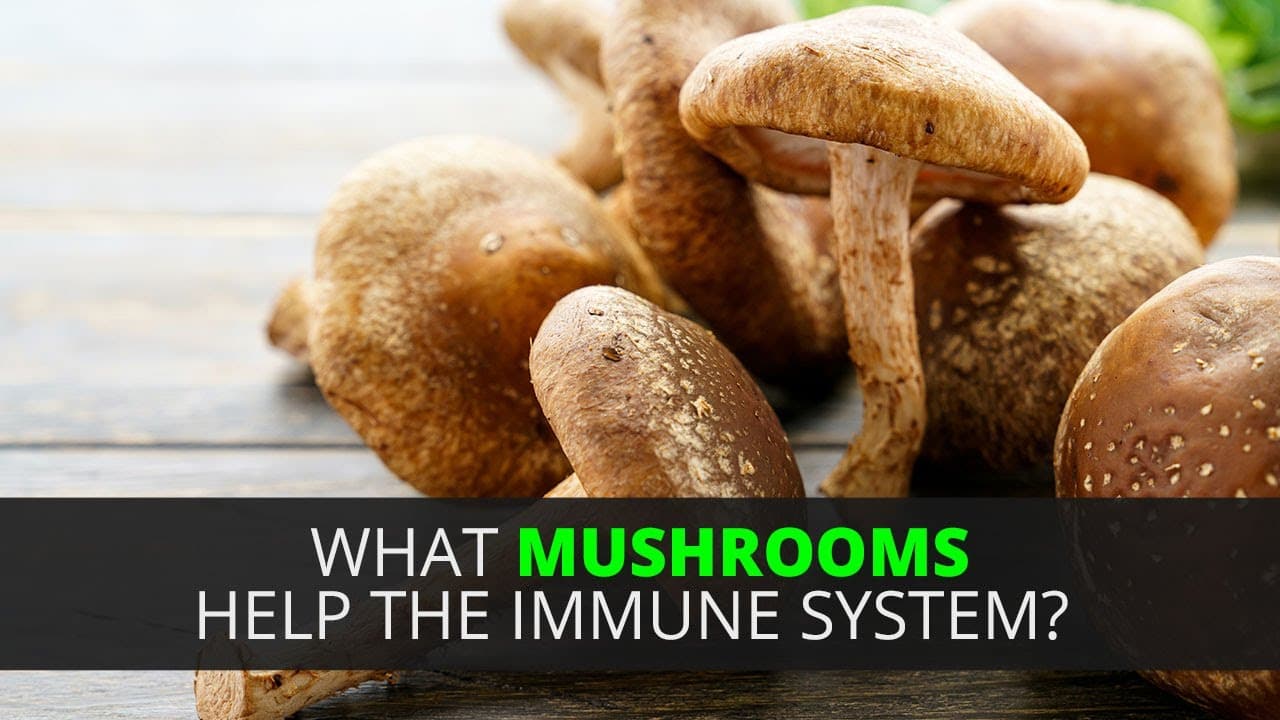
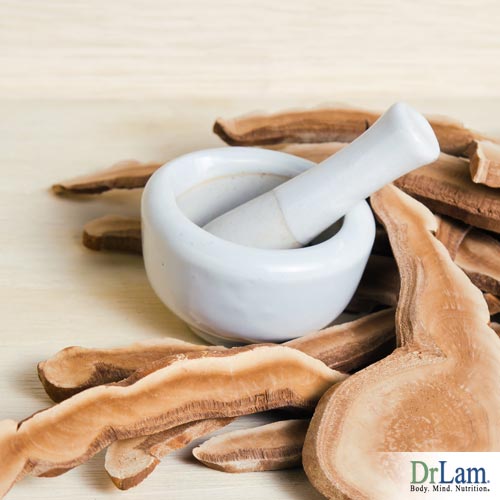 Mushroom health benefits have been known in the East for millennia, especially their immunostimulation effects. Mushrooms are the spore-bearing parts of fungi, which are a kingdom of their own that shares structural traits with plants and metabolic traits with animals. They create energy and carbon from breaking down organic matter, and they secrete their own enzymes.
Mushroom health benefits have been known in the East for millennia, especially their immunostimulation effects. Mushrooms are the spore-bearing parts of fungi, which are a kingdom of their own that shares structural traits with plants and metabolic traits with animals. They create energy and carbon from breaking down organic matter, and they secrete their own enzymes.
Mushrooms also contain polysaccharides like beta-glucans, triterpenes, which are precursors to steroids, and ergosterol, which serves similar functions in fungi as cholesterol does in animals.
Although there are hundreds of thousands of species of mushrooms, only a few have been studied extensively for their health properties, and the results are promising. Some types of mushrooms can kill the bacteria and viruses that affect people’s health, and they can also help in the fight against cancer.
They can help support healthy weight loss, reduce inflammation, balance metabolic dysfunction, and support healthy endocrine function. Their most impressive role still remains in their ability to modulate and improve immune system function.
The immune system is your natural defense against all forms of external invasion, such as pathogens and toxins, as well as internal damage, such as oxidative stress and cell debris. Its importance cannot be overstated, and supporting your immune system is one of the best things you can do for your health, whether you suffer from an immune system condition or not.
To understand the immune system, we have to look at its main areas of operation.
The first is cellular immunity, or cell-mediated immunity, which tags and gets rid of pathogens inside the cells, such as viruses. This type of immunity uses lymphocytes, Natural Killer cells (NK), and T-cytotoxic cells. No antibodies are involved in this type of immunity.
The second is humoral immunity, which operates in the extracellular fluids, or humoral fluids. This type of immunity destroys pathogens that are found outside of the cells, such as parasites or bacteria. It uses cytokines, B cells, antibodies, and antimicrobial peptides.
The immune system can also be categorized by innate immunity versus specific immunity.
Innate, or natural, immunity is what protects you from external threats by producing phagocytic cells (such as macrophages) that attack infectious pathogens, cytokines that stimulate the immune response cells to move to the sites of infections or injuries, and NKs that kill cancer cells or infected cells.
Specific immunity, on the other hand, is more specialized, targeting specific issues. It utilizes antibodies created by B cells, as well as cytokines created by T helper cells. The former support innate immunity and the latter support cellular immunity. Specific immunity also utilize NKs.
 Inflammation is part of the immune system’s response to danger. It is the process of flooding the site of invasion or injury with immune system cells, which also bring with it a rise in blood flow. This blood flow is what causes heat and redness, hallmarks of inflammation. The immune cells produce fluids that can seep into the surrounding area and create swelling, another hallmark of inflammation.
Inflammation is part of the immune system’s response to danger. It is the process of flooding the site of invasion or injury with immune system cells, which also bring with it a rise in blood flow. This blood flow is what causes heat and redness, hallmarks of inflammation. The immune cells produce fluids that can seep into the surrounding area and create swelling, another hallmark of inflammation.
The fact is inflammation is a healthy and vital process that can shield us from much harm, so it is not inherently bad. You cannot avoid inflammation if you tried, it is just a matter of how often, how intense, and how long lasting it is that should be of concern.
The problem arises when inflammation becomes chronic or is triggered by the weakening of the immune system. Both can occur when there is consistent stress. Although your body is made to deal with acute stress, modern lifestyles create a state of chronic stress for most of us. This puts a lot of pressure on the adrenal glands to produce the body’s main anti-stress hormone, cortisol, along with other stress hormones like adrenaline and norepinephrine.
When the adrenals are overworked, their output of stress hormones begins to dysregulate, causing a state of Adrenal Fatigue Syndrome (AFS), with symptoms like fatigue, weight gain, lack of energy upon rising, difficulty losing weight, sleep-onset insomnia, sleep-maintenance insomnia, food and drug allergies, low libido, fertility issues, anxiety, mild depression, and lowered immunity.
Cortisol is a miracle hormone; it has vital functions like regulating blood pressure and blood-sugar levels, maintaining heart and blood vessel function, suppressing the immune system, and neutralizing inflammation.
For these last two functions, we can see how cortisol plays a very important role in the immune system and the inflammation response of the body, which is part of the NeuroEndoMetabolic (NEM) Stress Response – the body’s global response to stress.
The NEM is made up of six circuits of organs and systems that work together to fight stress. They are the hormone, the metabolism, the cardionomic, the neuroaffect, the inflammation, and the detoxification responses.
The immune system cells, microbiome, and the gut are all part of the inflammation response of the NEM, and their job is to eliminate the threat, clear out the damaged cells and tissues, and to begin the repair process.
Cortisol plays a key role in these two responses. When the inflammation response has finished its job, cortisol is sent to suppress it so the body can rest and recover. This gives a chance for the NEM’s detoxification response to take over and clean out the debris left behind after the immune system has finished.
In AFS, although at first cortisol levels rise to meet the growing demand, they eventually drop when the adrenals become exhausted. This can leave the inflammation to run uncontrolled in the body.
Add to this the fact that the stress that causes AFS is also partly responsible for aggravating the inflammation, and you have a recipe for disaster. First of all, stress can dysregulate the cytokines responsible for proinflammatory actions, and this can suppress both the humoral and cellular types of immunity. This leads to slow wound healing, decreased efficacy in cancer cell inhibition, and weakened defenses against infections.
 Stress can also create a state of dysbiosis in the gastrointestinal tract, where the microbiome gets out of balance. This leads to leaks in the walls of the intestines, letting things into the bloodstream that shouldn’t be there. And of course, when the immune system recognizes these unwelcomed guests, it mounts an attack. The cycle keeps going until the leaks are sealed up, which usually takes a change in diet, supplementation, and stress management.
Stress can also create a state of dysbiosis in the gastrointestinal tract, where the microbiome gets out of balance. This leads to leaks in the walls of the intestines, letting things into the bloodstream that shouldn’t be there. And of course, when the immune system recognizes these unwelcomed guests, it mounts an attack. The cycle keeps going until the leaks are sealed up, which usually takes a change in diet, supplementation, and stress management.
All of these factors can contribute to a weakened immune system, raising the risk of a chronic inflammation that can’t even fight infections or stimulate repair. Plus, with consistently high levels of proinflammatory cytokines in the system, the risk of autoimmunity also goes up.
As you can see, getting stress under control, healing the adrenals and the overall NEM stress response, and balancing the immune system is essential if you want to avoid these devastating risks. One way to do that is through ensuring a good intake of immune-system-supporting nutrients.
What’s interesting to note is that the immune cells, such as NKs, macrophages, neutrophils, and dendritic cells, actually have specific receptors for mushroom polysaccharides. This is why mushroom health benefits are amazing for the immune system.
One of the most important mushroom health benefits is their high concentration of antioxidants such as ergothioneine. Ergothioneine contains sulfur and it has the ability to stave off oxidative damage to DNA. It is a type of cytoprotectant or a protector of cells, and it is found more concentrated in areas of the body where there are high amounts of oxidative stress, such as the liver and the lenses of the eyes.
Ergothioneine can even get into and protect, the mitochondria, the little organelles inside the cells where ATP energy is produced, and the energy we need to live. This is one of the greatest mushroom health benefits for increasing energy and slowing down the aging process.
One of the most important mushroom health benefits is their beta-glucan content, which are polysaccharides that are found naturally in the cell walls of some types of bacteria and fungi. The 1,3 beta-glucans are unique to yeast and mushrooms only.
Generally, mushrooms stimulate a predominant cytotoxic response by increasing Th1 cytokine production; while at the same time they usually suppress humoral (antibody dependent) immunity.
Beta-glucans increase immunity by improving the functions of NKs and macrophages, which, as we’ve just talked about, attack cancer cells and pathogens.
This is partly why beta-glucans have anti-cancer and tumor-inhibiting properties, and why they can also help prevent the metastasis of tumors. And for those undergoing chemotherapy and radiation therapy, the beta-glucans found in mushrooms can aid in the hematopoiesis process – which is the process of forming new blood cells.
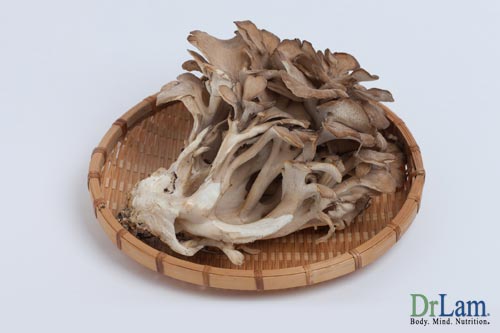 But perhaps the most useful function of beta-glucans is their ability to activate the complement system. The complement system is a part of the innate immune system that “complements” the action of antibodies and phagocytes. It also attacks the plasma membranes of pathogens and stimulates inflammation.
But perhaps the most useful function of beta-glucans is their ability to activate the complement system. The complement system is a part of the innate immune system that “complements” the action of antibodies and phagocytes. It also attacks the plasma membranes of pathogens and stimulates inflammation.
The complement system is made up of over 20 proteins that are found in the blood. It is basically a system of molecules, with no cells of its own. These proteins, usually synthesized in the liver, circulate in the blood yet are not active unless they are needed.
This system is activated either as a response to the presence of polysaccharides that are found on the surface of bacteria or fungi, such as the beta-glucans in mushrooms, or when they are needed by the specific immune system.
This is the main reason why eating mushrooms or taking supplements made from mushrooms can be beneficial to your health. You are getting your immune system strengthened through the introduction of beta-glucans, a natural and healthy immune booster.
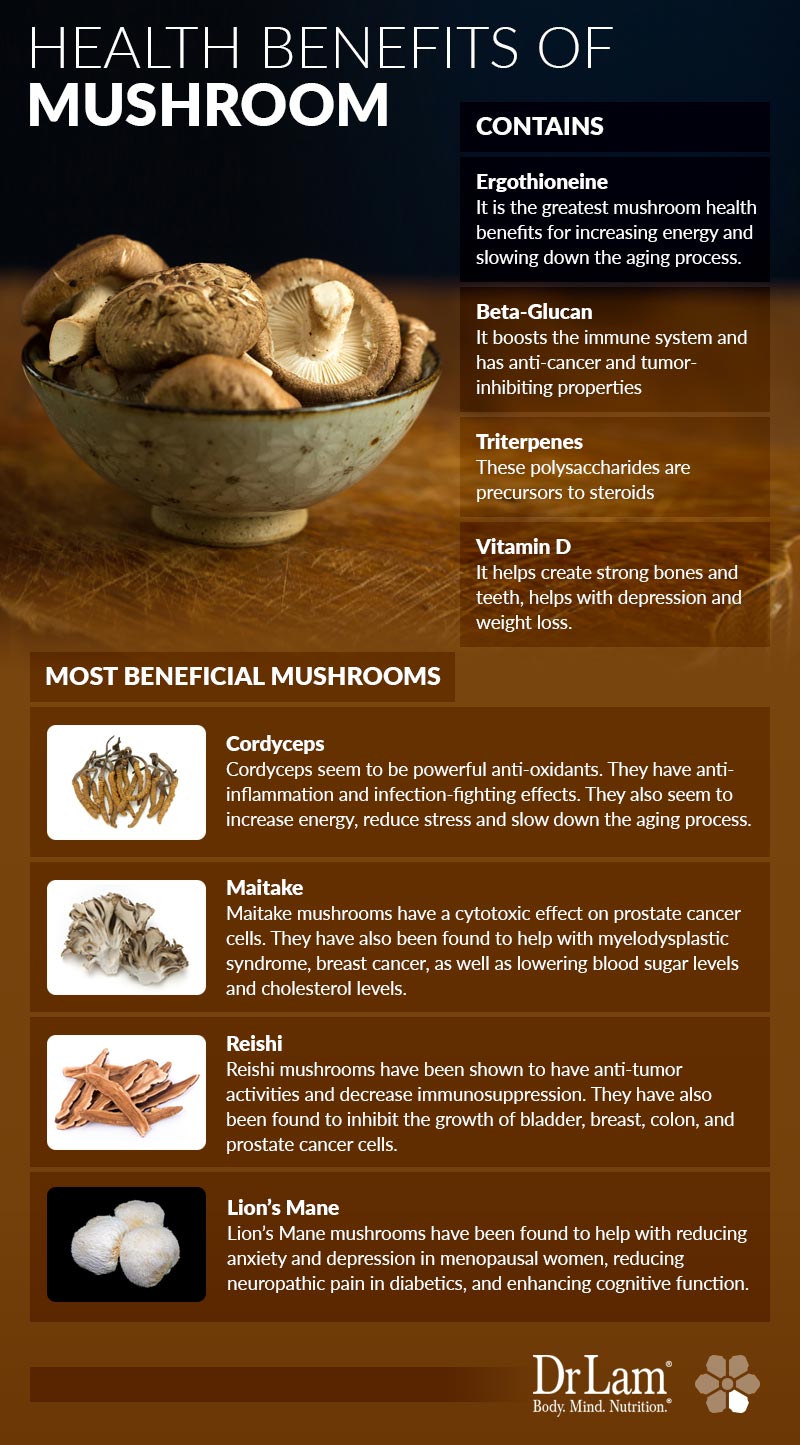
One type of medicinal mushrooms that have been used by Chinese and Tibetan folk healers for hundreds of years is the Cordyceps Sinensis, a type of fungus that grows on the backs of caterpillars. It is actually a parasitic fungus that eventually eats up its caterpillar host as it grows.
Cordyceps are found at high altitudes, especially the Sikkim region. They are used for the treatment of over 20 different illnesses in traditional Chinese medicine, from common colds to cancer. They are usually consumed in the form of teas or tinctures made from grinding the mushrooms. Nowadays, most cordyceps supplements are made from cordyceps cultivated from a grain-based substrate rather than from insects.
Although the exact methods of their actions are not yet fully understood, cordyceps seem to be powerful anti-oxidants, like their mushrooms cousins. They have anti-inflammation and infection-fighting effects. They also seem to increase energy, reduce stress and slow down the aging process. Cordyceps reputation is driven by its positive property of having a general nurturing effect on the entire body. It is not stimulating but support healthy energy, and thus can be of great benefit to those whose body is sensitive, weak, or prone to crashes.
Recent studies were conducted on their wide-ranging healing properties, and they verified their effectiveness. The modulatory effects of cordyceps on the immune system are especially interesting, showing tumor inhibition and anti-cancer properties. They have also been shown to have positive effects on the health of the kidneys and liver.
Although most of these studies were conducted on non-human subjects, mushroom health benefits and healing effects seem to have a long history in many ancient medicinal traditions, including Ayurveda and Chinese Medicine. More scientific studies are underway as well.
Like with other mushrooms, cordyceps are most prized for stimulating the immune system’s cells to fight free radicals and infections. They are some of the few supplements that are recommended by nutritionists and holistic health practitioners to those with autoimmune disorders since they can modulate the immune system rather than add to its hyperactivity.
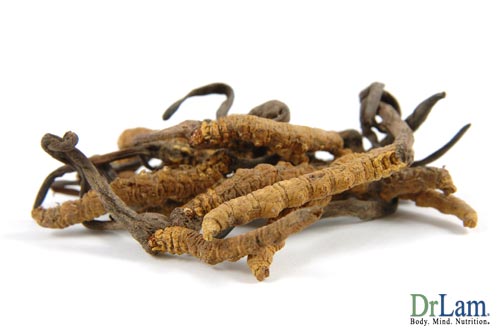 Cordyceps are also a kind of adaptogen, but not stimulating. It can help the body adapt to stress and boost energy levels without the artificial hype sometimes seen in stimulants such herbs and glandulars. As you can imagine, this can be especially useful if you have AFS, since your ability to handle stress is compromised from the dysregulation of your adrenal glands, and you need as much energy as you can get but not have adverse adrenal crashes due to excessive stimulation.
Cordyceps are also a kind of adaptogen, but not stimulating. It can help the body adapt to stress and boost energy levels without the artificial hype sometimes seen in stimulants such herbs and glandulars. As you can imagine, this can be especially useful if you have AFS, since your ability to handle stress is compromised from the dysregulation of your adrenal glands, and you need as much energy as you can get but not have adverse adrenal crashes due to excessive stimulation.
But if you have AFS, an autoimmune disorder, or any health condition in general, you should never use supplements without fully understanding their effects and their possible risks.
First of all, the one thing you should never do is take the shotgun approach to supplementation, which is when you take many different supplements at once, thinking that this covers all of your bases. This can backfire and create harmful side effects at worst, and at best you will not really know which supplements are working for you and which ones are not.
Secondly, some supplements that aid with one condition may actually be detrimental to another. For example, as we already cautioned, taking immunostimulatory supplements to help with an infection may aggravate an autoimmune condition as they can stimulate an already hyperactive immune system.
This is especially the case if you have more advanced stages of AFS where your clearance systems are not functioning as quickly as they should be. In this case, you’ll find that if you take a lot of supplements, the used-up by products will stay in your system for longer than necessary, clogging up the liver, kidneys and other detoxification pathways.
And, as we mentioned, this will then affect your inflammation response and the rest of the NEM.
An in vitro study in Japan showed the bioactive beta-glucans in Maitake mushrooms have a cytotoxic effect on prostate cancer cells, which is a very promising finding for prostate cancer treatment. Another study found Maitake mushrooms help with myelodysplastic syndrome, which is a clonal bone marrow stem cell disorder. They have also been found to help with breast cancer, as well as lowering blood sugar levels and cholesterol levels.
Reishi mushrooms have been shown to have anti-tumor activities in mice inoculated with sarcomas, and they have been shown to decrease immunosuppression in mice that were treated with cyclophosphamide. They have also been found to inhibit the growth of bladder, breast, colon, and prostate cancer cells.
Lion’s Mane mushrooms have been found to help with reducing anxiety and depression in menopausal women, reducing neuropathic pain in diabetics, and enhancing cognitive function.
Adding mushrooms to your diet is one way to get mushroom health benefits. The exceptions to this are if you have a sensitivity or allergy to mushrooms. It’s also recommended that you cook your mushrooms, as some contain toxic compounds that are then neutralized by cooking.
Also if you are in the advanced stages of AFS, where digesting protein becomes a little more difficult, or if you feel that supplements might really boost your health, being supervised by an experienced medical professional or getting nutritional coaching may be the way to go about this.
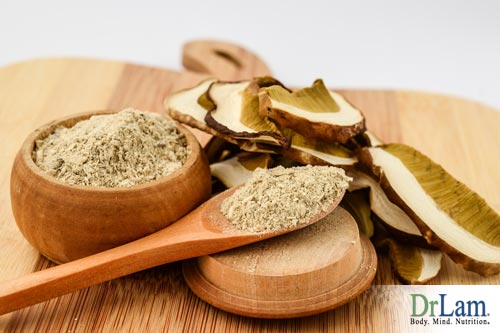 Mushroom extracts can come in hot aqueous form, where the ground mushrooms are cooked in hot water, the fluid is evaporated and the residue is dried. This yields high polysaccharides but lower triterpenes. Another form is ethanolic, which contains more triterpenes than polysaccharides. And there is also a combined form.
Mushroom extracts can come in hot aqueous form, where the ground mushrooms are cooked in hot water, the fluid is evaporated and the residue is dried. This yields high polysaccharides but lower triterpenes. Another form is ethanolic, which contains more triterpenes than polysaccharides. And there is also a combined form.
Some of the other mushroom health benefits that you might reap include:
Weight loss and improved insulin levels. First of all, mushrooms provide a filling and healthy alternative to animal protein that is low in the glycemic index. This helps in stabilizing blood sugar levels, which helps in maintaining healthy insulin levels and overall hormonal balance in the body.
This is a great way to shed weight and keep it off, which is something that is very beneficial for those with AFS, as weight tends to be an issue for them. It can also help break the sugar and insulin spikes that sometimes come with AFS, which can lead to hypoglycemic episodes as well as insulin resistance, the prelude to type 2 diabetes. And if you have diabetes, mushrooms are an excellent food for the same reasons listed.
Mushrooms are also a good source of vitamin D, which help create strong bones and teeth, help with depression, and, again, help with weight loss. Mushrooms contain ergosterol, and when it gets into contact with UV light, it converts to Vitamin D. Cut up mushrooms and leave them in the sun for 10-15 minutes, and they will increase their Vitamin D content by 10 times, which is adequate daily intake of vitamin D.
And finally, mushrooms can be a great aid in aiding thyroid function and overall metabolism.
The conclusion here is that mushroom health benefits are something to really consider for whatever condition you may have, or even if you just want to improve your athletic ability or energy levels. With very little risks, they are a great addition to your diet and health plan.
Mushroom health benefits include their powerful anti-oxidant action, their ability to modulate the immune system, their ability to regulate blood sugar and insulin levels, and their vitamin D content. They are excellent for weight loss, metabolism, and hormonal balance. They can be added to your diet or taken in supplement form.
